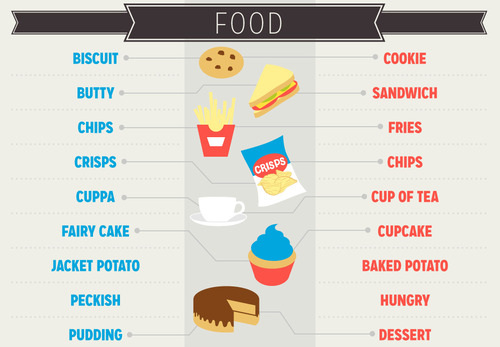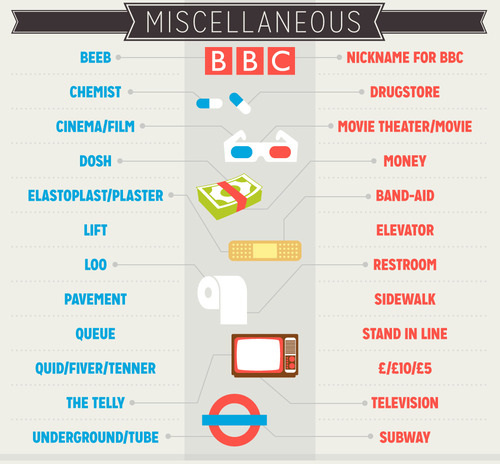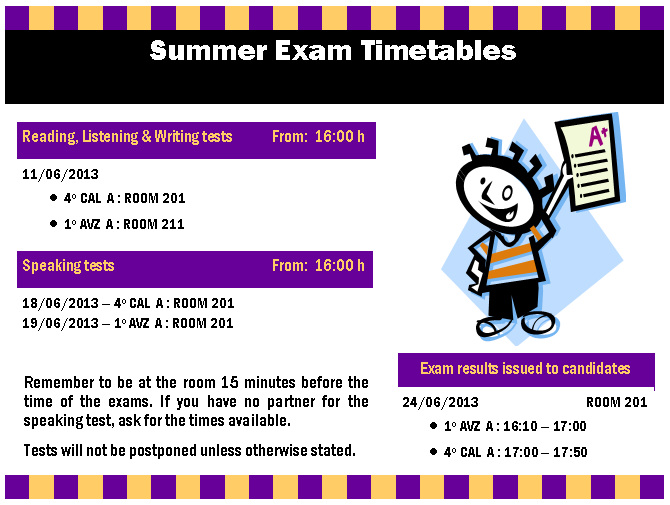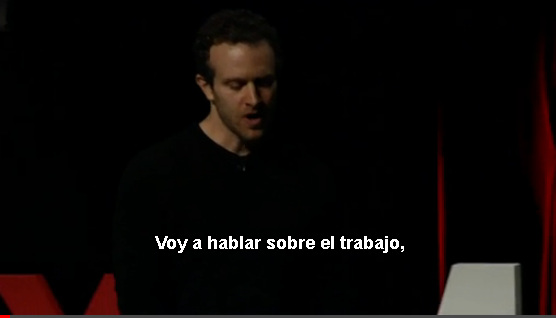Many things have been said today on our last day! Let's start by adding the link to the school satisfaction survey on teaching staff, which is anonymous. Please, help us improve. Just do the survey on-line - it only takes some minutes of your precious lives ;-) As for the criteria to assess your tests, here you are the link to the Candidate's Guide to the exams. Have a look at the relevant items regarding the writing test and the speaking production and interaction. Have a look at the following tips on how to be successfull at oral exams:
Below you'll find a useful picture guide to differentiate American and British English. Thanks Rubén for sharing!
We learnt plenty of things about the origins of several common English words yesterday. In addition we also learnt how to make new words by using prefixes which add extra meaning, e.g. under-, over-, etc. Pronunciation was also focused on this, that is, on word stress in words with prefixes (having one main stress on the base word and a secondary stress on the prefix).
Check this link to review stress patterns in pronunciation and this other one to review relative clauses.
We also studied the colloquial English section in which an English lexicographer talked about the new words that have entered the English language and the way they've done it. Moreover, in the "In the Street" section, four non-native speakers of English were asked what English words have been 'imported' into their language, and if they think it would be better to have their own words for this. What's your opinion on this matter?
The context of our last lesson is words English has 'borrowed' from other languages. We read an extract from a book called The meaning of Tingo, where the author takes a humorous look at words from other languages which have no exact equivalent in English. If you are dying to learn more words, check out the loanwords or borrowings, which are derived from other languages. The topic was the pefect excuse to use the grammar point: relative clauses. We revised and extended the knowledge of both defining and non-defining clauses. To learn more about it and practise, below you'll find a handful of links: - Explanation and further practice 1 - Explanation and online exercise 2 - Paraphrasing - Test - Multiple choice exercise - Test - Cloze exercise There's also a paraphrasing exercise on relative clauses in Docs Section which you can download. In addition, enjoy the videos below:
Deceptive advertising, that was the main topic yesterday in class. Businesses use advertising to tell consumers about the goods and services they are selling in order to convince people to buy their products. Nevertheless, some businesses cross the line by marketing deceptive advertising, such as Pumative. Sometimes advertising and media can manipulate and persuade an unwary consumer. Here you are a list of 14 false advertising scandals that cost brands millions and a video on the same topic. What about having a look at advertising vocabulary? Check this web page and fill in the gaps in this advertising essay.
Then, we saw how to write an article by means of newspapers extracts. The paragraph plan of an article lead us to remember how to write headlines. As a result, I found it useful to include a listening exercise on the media. It also includes vocabulary related to business and advertising. Reader’s Digest has
a. declared bankruptcy for the first time in years b. been losing money for years c. been trying to survive in the digital era 2. Reader’s Digest has an audience of a. 40 million b. 70 million c. 17 million 3. Digital newspapers a. made Internet popular 15 years ago b. reduce paper waste c. are read with the morning coffee now 4. In 5 years a. advertising sales will reach the level of 1980s b. most newspapers will have disappeared c. newspapers will reduce their benefits in 50% 5. The orange country newspaper a. have more subscriptions than 10 years ago b. have a new management c. have professionals from closed newspapers Answers key: 1b, 2a, 3b, 4b, 5b Today we corrected your homework and we revise also the "I wish..." structures. Here you are some exercises to revise the grammar point: exercise 1, exercise 2 and exercise 3 - two of them are taken from the Student's book web page. However, this wasn't the only grammar point studied in class. We also had a look at the compound relative pronouns: whenever, whoever, whatever, etc. Visit the Student's book web page to revise this. In addition, you can also check out the following link for further practice: wh-ever clauses. Afterwards, we focused our attention on business and advertising vocabulary. Click on the following links to practise it: - Student's Book exercise - Advertising vocabulary - Business vocabulary (list) - Business vocabulary (games) As for pronunciation, there are some words in English which are homographs but they're pronounced differently to distinguish the noun from the verbs, that is, the stressed syllable is changed. Here are some more examples of nouns and verbs that have the same form, but different pronunciation. You can listen to the audio to hear the differences in syllable stress. Finally, as we also talked about ways to improve productivity at work when we read a text on bringing a dozen of bagels to the office to reward employees. Let's watch some TEDtalks about improving productivity - subtitles are available. Click on them to get the link. The art of stress-free productivity - no subtitles provided.
This has been a very productive week, guys! Through the topic of science we've looked at word related to science and the changing stress in word families on these words. We also learned the rules for using a variety of quantifiers correctly: all, every, most, no, none, any, both, neither and either. Click here to visit the Student's Book web page to practise your knowledge on quantifiers. For further explanation and exercises on the British Council web page click here. We also listened to John Bigos, the managing director of London Duck Tours limited, which offer guided tours of the city of London. The video let us know some important colloquial English expressions. Afterwards, we also listened to some people being interviewed in the street about their favourite city and the city they would like to visit. Then, we introduced the new lesson which focuses on wish structures to talk about present and past regrets, and to express annoyance, that is, things that annoy us in our daily life. Let's have a look at the following links: - Explanation and exercises: wish - Explanation and exercises: I wish - If only - Wishes and regrets multiple choice exercise The vocabulary focus lies on different ways of expressing feelings, with a verb or with an -ed or -ing adjective. Let's practise it with the following exercises: exercise 1, exercise 2 and exercise 3. Finally, here you are some songs were "I wish" and "if only" structures are used so that you can practise your listening skill: - The reason by Hoobastank in lyrics training
|













 RSS Feed
RSS Feed
